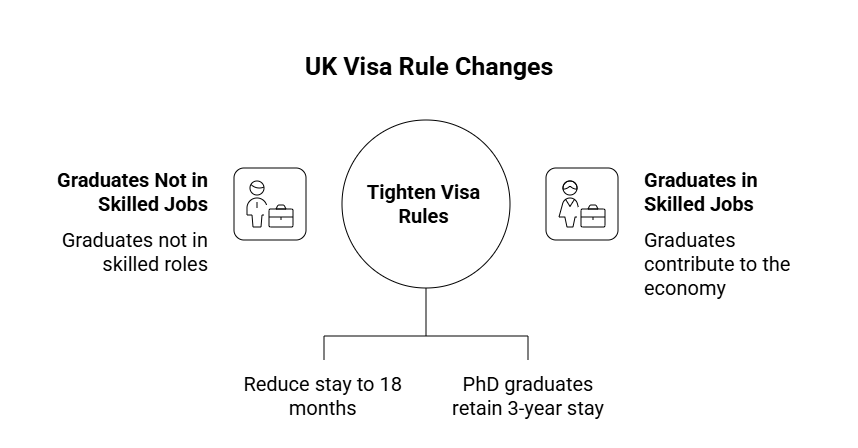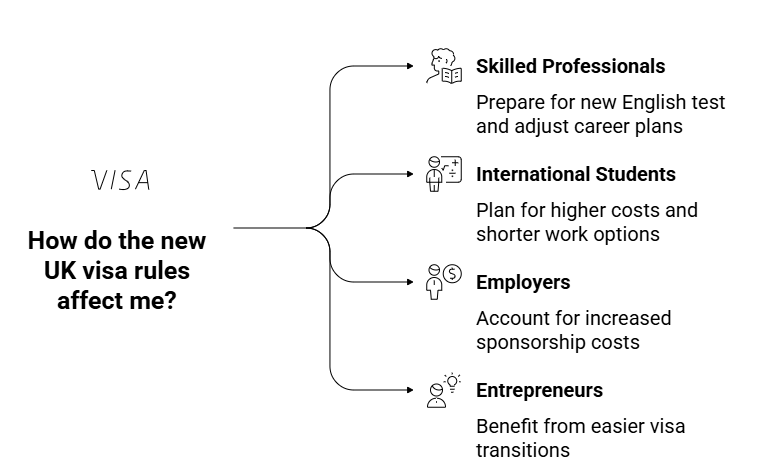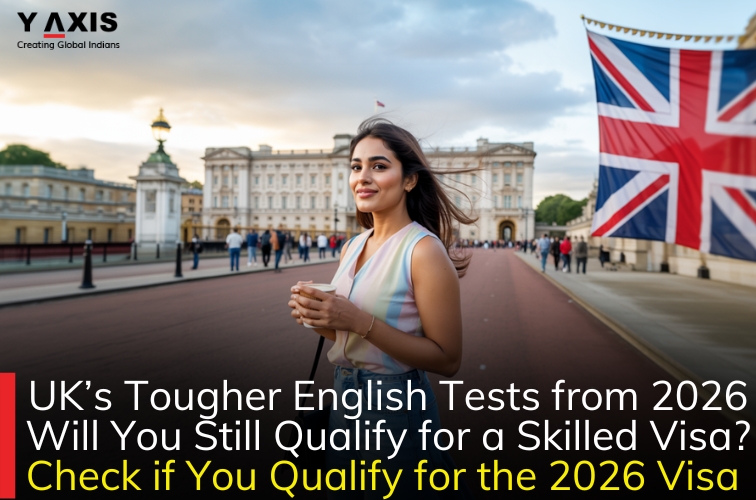Posted on October 15 2025
UK’s Tougher English Tests from 2026: Will You Still Qualify for a Skilled Visa?
By , Editor
Updated October 15 2025
Highlights: UK Announces Tougher English Tests and Stricter Visa Rules for Migrants from 2026
- The UK government has announced new immigration reforms set to begin from January 2026, impacting skilled workers, students, and employers.
- Skilled visa applicants, including Indians, must clear a B2-level English test (A-Level/Class 12 equivalent) approved by the Home Office.
- From January 2027, graduate visa holders will get only 18 months to secure employment after completing studies.
- Student visa financial proof increases to £1,529/month in London and £1,171/month outside London for 2025–2026.
- The Immigration Skills Charge for UK employers rises 32%, while the High Potential Individual visa cap doubles to 8,000.
*Want to apply for a UK visa? Let Y-Axis guide you with the process
UK Raises English Bar for Skilled Workers from January 2026
Beginning January 8, 2026, all skilled visa applicants — including professionals from India — will have to prove a higher level of English proficiency to qualify for UK work visas. Under the new rule, candidates must meet B2-level proficiency, equivalent to a UK A-Level or Class 12 standard.
The Secure English Language Test (SELT), to be conducted by Home Office–approved providers, will evaluate applicants on their speaking, listening, reading, and writing skills. Results will be verified during the visa application process, ensuring authenticity and fairness.
According to the UK Home Office, this change is designed to help migrants integrate more easily into British society and contribute more effectively to the economy.
Home Secretary Shabana Mahmood underlined the purpose behind the move, saying:
“It is unacceptable for migrants to come here without learning our language or being able to contribute to our national life. If you come to this country, you must learn our language and play your part.”
The new English test standard reflects the UK government’s wider goal to raise the skill threshold for migration and ensure that incoming workers are better equipped linguistically and professionally to meet the demands of the UK job market.
*Want to apply for a UK skilled worker visa? Talk to experts at Y-Axis for end-to-end assistance.
Shorter Stay, Higher Standards: UK Tightens Graduate Visa Rules
The UK’s Graduate Route Visa, which has been immensely popular among Indian students, will undergo significant changes starting January 1, 2027. The grace period for international graduates to secure employment after completing their degree will be reduced from 24 months to 18 months. However, PhD graduates will continue to enjoy a three-year post-study stay.
The Home Office justified the change by citing internal data showing that many graduates were not progressing into graduate-level jobs, a key goal of the Graduate Route.
The update aims to ensure that those staying on in the UK transition into high-skill, graduate-level roles and actively contribute to the economy.
This adjustment is likely to impact the growing Indian student community in the UK. In 2023 alone, Indian nationals accounted for over 40% of all Graduate Route visas issued, highlighting their significant presence in UK higher education.

*Want to apply for a UK post-study work permit? Talk to experts at Y-Axis to assist you with the proces
UK Hikes Financial and Visa Costs for Students from 2025
As part of its ongoing immigration reforms, the UK government has announced new financial and sponsorship requirements to make the system more sustainable and reduce misuse. The updates affect both international students and UK employers hiring foreign workers.
Higher Financial Proof for International Students
Starting with the 2025–2026 academic year, international students applying for UK study visas will need to show higher maintenance funds to prove they can support themselves during their studies.
- £1,529 per month for students studying in London (previously £1,483)
- £1,171 per month for students studying outside London (previously £1,136)
This adjustment reflects the rising cost of living in the UK and ensures that students have sufficient financial resources while pursuing their education.
*Want to apply for a UK Student visa? Let Y-Axis help you with the process
UK Doubles High Potential Individual Visas to 8,000 to Retain Top Talent
In a move to attract top-tier global professionals, the UK is expanding opportunities for highly skilled migrants:
- The number of universities eligible under the High Potential Individual (HPI) visa route will double, with the total cap rising from 4,000 to 8,000 visas per year.
- The Global Talent route will also undergo reforms next year to welcome more researchers, innovators, and creative professionals, including those in film, TV, and design.
- Additionally, international entrepreneurs studying in the UK will soon be able to seamlessly transition from student status to the Innovator Founder visa, encouraging start-ups and innovation.
These changes are designed to retain the world’s best talent — especially from countries like India, which consistently ranks among the top three sources of highly skilled migrants to the UK.
*Want to apply for an HPI visa? Get in touch with experts at Y-Axis to help you with the process.
What the UK’s New Visa Rules Mean for Indians
As one of the largest migrant and student communities in the UK, Indians will feel a direct impact from the government’s new immigration changes. The reforms affect students, professionals, employers, and entrepreneurs alike — here’s how:
- Skilled Professionals: Must prepare early for the new B2-level English language test coming into effect from January 2026.
- International Students: Should plan for higher financial requirements and adjust to shorter post-study work options under the Graduate Route.
- Employers: Need to account for the 32% increase in the Immigration Skills Charge (ISC) when sponsoring skilled foreign workers.
- Entrepreneurs & Innovators: Will benefit from smoother transitions from student to business visas, encouraging startup creation in the UK.

According to UK Home Office data, Indian nationals received over 142,800 Skilled Worker visas in 2023, a 65% year-on-year increase, highlighting India’s crucial role in the UK’s skilled workforce.
*Want to migrate to the UK? Sign up with Y-Axis for complete immigration assistance
Why the UK is Tightening Its Immigration Rules
The UK’s latest visa reforms are part of a wider strategy to manage record-high migration levels while ensuring that immigration contributes effectively to the country’s economy and society.
In 2023, the UK recorded net migration of 685,000, prompting the government to implement stricter, skill-focused measures. These reforms aim to:
- Prioritize skilled, English-proficient professionals who can integrate seamlessly into UK society.
- Reduce low-skilled or non-integrating migration, focusing on applicants who add long-term value.
- Strengthen local workforce development by investing more in domestic talent training.
- Enhance border integrity and system transparency, preventing visa misuse and ensuring fair access.
The introduction of the Secure English Language Test (SELT) and tighter visa policies mark a major shift toward a merit-based immigration system — one focused on productivity, professionalism, and integration.
*Are you looking for step-by-step assistance with UK immigration? Contact Y-Axis, the world’s No.1 overseas immigration consultancy!
For recent immigration updates on the UK, check out Y-Axis UK immigration News!
FAQs
1. What new English language test requirements has the UK introduced for Skilled Worker Visa applicants?
The UK government has raised the minimum English proficiency requirement for Skilled Worker Visa applicants from CEFR B1 (intermediate) to CEFR B2 (upper-intermediate) across all four skills—speaking, listening, reading, and writing. This means applicants must now demonstrate a higher level of fluency suitable for professional communication and workplace interaction. The change aims to ensure that migrant workers can adapt more effectively to UK workplaces, contribute productively, and integrate socially, supporting the government’s objective of maintaining high standards in skilled migration and long-term settlement.
2. When will the new English language rules for UK skilled visa applicants come into effect?
The new English language requirement, increasing the level from B1 to B2, will take effect in early 2026 for Skilled Worker Visa applicants and other relevant categories. Applicants applying before the implementation date will be assessed under the old rules, while new applicants afterward must meet the updated standards. The Home Office has advised that these reforms are part of the broader immigration policy changes planned for 2025–26, giving prospective migrants sufficient time to prepare and meet the enhanced English proficiency levels.
3. Which visa categories are affected by the UK’s tougher English language test rules?
The revised English language requirement primarily affects Skilled Worker Visa applicants, as well as certain related categories like the High Potential Individual and Scale-up visas. Additionally, the Home Office has confirmed that dependents and family visa routes will gradually be aligned to similar standards, ensuring consistency across immigration categories. Adult dependents will also need to demonstrate progressive English levels at each stage—entry, extension, and settlement—reflecting the UK’s intent to strengthen language integration across the migration system.
4. Why has the UK government decided to tighten English language requirements for foreign workers?
The UK government’s decision to introduce tougher English language rules is rooted in promoting better integration and productivity among foreign workers. By ensuring migrants have stronger English communication skills, the government aims to improve workplace efficiency, social participation, and access to essential public services. The new measures are also part of a wider policy framework to regulate migration more effectively and encourage long-term settlement of individuals who can integrate smoothly into British society and contribute to its economy from the outset.
5. What are the minimum English proficiency levels required under the new UK skilled visa rules?
Under the updated Skilled Worker Visa rules, applicants must demonstrate English proficiency at the B2 level of the Common European Framework of Reference for Languages (CEFR). This means they must be able to communicate effectively in both familiar and complex situations in a professional context. For dependents, the requirements are tiered: A1 at entry, A2 at extension, and B2 for settlement. The higher language benchmark is intended to ensure that skilled workers possess strong language abilities that enable them to adapt to the UK’s work and social environments.
6. How will the new English test policy impact Indian applicants seeking UK skilled visas?
Indian applicants are among those most affected by the new English test rules, as the shift from B1 to B2 represents a significant step up in difficulty. Many applicants will need additional preparation, training, or coaching to achieve the required score. This could increase processing times and costs associated with taking approved tests such as IELTS for UKVI or Pearson PTE Academic UKVI. However, Indian professionals with higher education qualifications taught in English may still meet the requirement through degree verification, making early planning and preparation essential.
7. Are existing Skilled Worker Visa holders required to retake the English language test?
No, existing Skilled Worker Visa holders are not required to retake the English language test simply because the standards have changed. The new requirement applies only to new applications submitted after the effective date of implementation. Current visa holders can continue to live and work in the UK under the conditions of their existing visa. However, those seeking extensions, status changes, or indefinite leave to remain in the future may need to satisfy the updated English language requirement depending on when their new application is lodged.
8. What types of English tests are now accepted for UK skilled visa applications?
Applicants must take a Secure English Language Test (SELT) approved by the UK Home Office to demonstrate their English proficiency. Accepted tests include IELTS for UKVI, Pearson PTE Academic UKVI, LanguageCert, and Trinity College London tests. The test must be taken at an authorised test centre, and the result must not be older than two years at the time of application. In some cases, applicants with degrees taught in English may submit their qualifications as evidence, subject to verification by the UK’s recognised authorities such as Ecctis.
9. Do the new English language requirements apply to dependents of skilled visa holders?
Yes, adult dependents of Skilled Worker Visa holders will also need to meet English language requirements under the revised rules. They must demonstrate A1 level English when entering the UK, A2 when applying for visa extensions, and B2 when applying for settlement or indefinite leave to remain. This progressive system ensures that dependents gradually improve their English proficiency over time, enabling them to integrate better into UK society. Children under 18 are generally exempt from English language testing requirements.
10. How can applicants prepare for the updated English proficiency standards for UK work visas?
Applicants should begin preparation well in advance by assessing their current English level and identifying areas for improvement. Enrolling in a certified English language course focused on achieving B2-level fluency can be beneficial. Practising through sample test materials from approved providers such as IELTS or Pearson and scheduling mock exams can help build confidence. Applicants relying on English-taught degrees should gather relevant documentation early for verification. Planning ahead ensures compliance with the new rules and minimises the risk of delays or refusals during the visa process.
Tags:
UK skilled visa
UK visas
UK skilled worker visa
UK Immigration
Migrate to the UK
UK Immigration news
new UK visa rules
revised English language requirements
Study in the UK
UK Student visa
UK graduate visa
UK Skilled visa
Share
Options for you by Y-Axis
Get it on your mobile
Get News alerts
Contact Y-Axis

